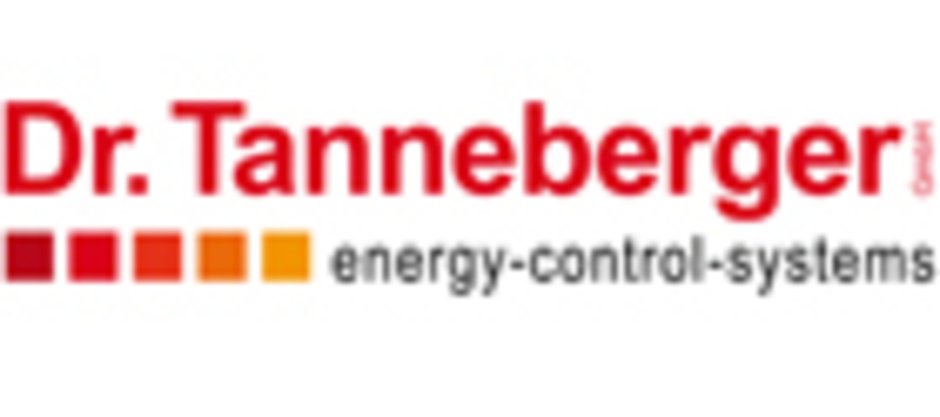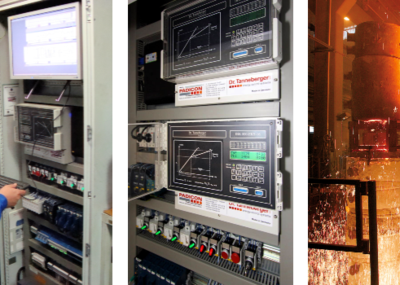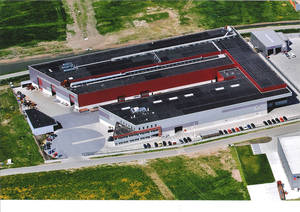 Office building of the Van Voorden (Netherlands) |
The Van Voorden foundry designs and manufactures ship's propellers, nozzles and yacht propellers for the maritime market. Production facilities featuring six induction furnaces and automated systems provide a sound foundation for the manufacture of high-quality products. The company also produces high-alloy cast components such as pump housings, double-walled pipes, propellers and other wear-resistant components. These products are used by the excavation industry the world over.
Large volumes of molten metal are required simultaneously for the manufacture of the above-mentioned heavy-duty cast components, which can be as heavy as 30,000 kg. Peak loads were giving cause for concern at the foundry (see Fig. 1), and the overstepping of the agreed peak load was costing the company around 85,000 EUR per year. The company's management therefore set about finding out how other companies in the sector deal with this issue. In doing so, they came across the Affilips foundry in Tienen, Belgium, where the Padicon® system has been used to optimize loading since 2006. Loads have been permanently reduced as a result, and all experts at Affilips are fully convinced of the benefits the system has to offer. This enthusiasm spread to Van Voorden, and in December 2009 the company contacted optimization specialists in Radebeul. Installation of the foundry's new energy management system began on the 04.01.2010.
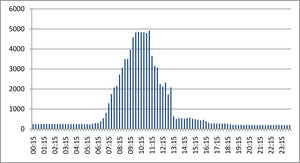 Fig. 1: The peak load at the foundry (without limiting measures) stood at 5773.6 kW on the 06.03.2009. | 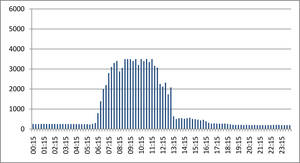 Fig. 2: The diagram shows that it was possible to restirct the peak load to 3500 kW further to the installation of the parallel difference power control system. |
The use of Padicon® to regulate loading on the basis of trend values has made the foundry's ovens more efficient. In addition, it enables Van Voorden to improve the organization of its processes using real-time monitoring. Smelting time schedules are now adjusted in order to optimize energy consumption and ensure a more consistent production process. Having operated with a peak load of 5773 kW prior to the implementation of parallel difference power control (see Fig. 1), the Padicon-monitored foundry now operates with a peak load of 3500 kW (see Fig. 2). The smelting process is not impeded by this reduction, and it is practically impossible for the new peak load to be exceeded.
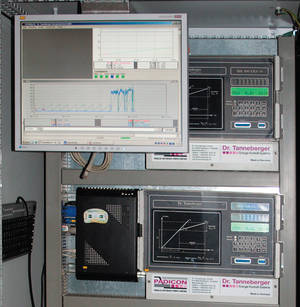 Adherence to the reduced peak load regulated and monitored by the energy control system saves the company nearly 100,000 Euro per year. |
Adherence to the reduced peak load regulated and monitored by the energy control system (see Fig. 3) saves the company nearly 100,000 EUR per year. In addition, the sustained reduction in energy consumption provides the purchasing department with a salient argument for the renegotiation of contracts with energy suppliers. It is now also easier for the energy supplier to accurately cope with demand. Real-time monitoring of all connected energy-consuming devices facilitates continuous analysis of problem issues, which in turn accelerates adjustments to potential production-related modifications. Padicon® is a patent-pending procedure, and facilitates the parallel, differentiated control of large electrical consumer loads without negatively affecting production processes. The reductions in power consumption achieved using the system are also attainable in other sectors where peak loads are an issue.
Energy control system
Monitoring identifies problem issues
Parallel difference power control makes it possible to achieve energy cost savings of over 20%. Continuous monitoring of weaknesses and potential optimization in production operations facilitates improvements in operational processes, which in turn increases energy efficiency. Padicon® uses Energy Transparency Software (ETS) - an energy control system consisting of various software modules. This modular structure offers a wide range of energy data management options, and the system can be modified to fit specific customer requirements. As data is made available online, it is possible to carry out data evaluation shortly after data gathering has been completed.
Heavy-duty casting
Freedom from cracks is key
Pumps used to transport highly abrasive media are subjected to a wide variety of wear-related loads. Heavy-duty cast steel is therefore a suitable material for the manufacture of such pumps, as it exhibits a greater level of resistance to wear than standard commercial steels. This comes as a result of the addition of specific alloy elements to it. Though heavy-duty cast steel is not as wear-resistant as Duro 22, for example, it does offer the crucial benefit of freedom from cracks.
See you at ![]() GIFA
GIFA
Hall 10 Booth D47
| Dr. Tanneberger GmbH is a leading manufacturer in "Control systems", "Measurement and test technology", "Information processing" and "Conultation, planning, services", for further information and contact details click here: Dr. Tanneberger GmbH |

